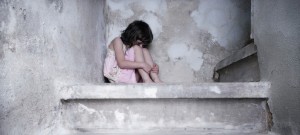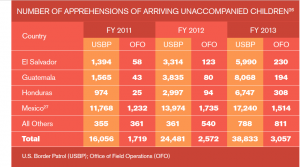The Truth About the “Border Crisis”: How Partisan Politics Hurt Children
This weekend, the White House announced that President Obama will not seek to fix our broken immigration system before the November elections. Although I was expecting it, my heart sank when I heard the official announcement. This is a letdown for Americans and aspiring Americans alike.
Among those incredibly frustrated are members of the Jewish community who have been advocating for decades for a comprehensive and commonsense immigration reform. This has serious consequences: thousands more hardworking immigrants — including many who’ve lived in the US for decades — will be torn from their homes, jobs, communities, and families.
It is unjust and unfair that partisan politics are getting in the way of actual changes that would improve peoples’ lives.
This is far from the first time we have seen politics stand in the way of fixing immigration policy. Just a few months ago, Congress started to catch wind that thousands of unaccompanied children were fleeing violence in Central America and seeking safety in the US, something the immigrant advocacy community has known for several years.— In El Salvador, Guatemala, and Honduras, gangs forcibly recruit children as young as 5, and kids who refuse are often tortured and killed. Children are also targeted by vigilante groups that indiscriminately kill youth in neighborhoods known for gang activity. Many of the children are seeking to reunite with their families who are living and working in the US. Due in part to congressional failure to pass comprehensive immigration reform, these children have been separated from their parents for years, with no hope of legally reuniting with their parents.
Numerous reports — including this one from the United Nations, this one and this one — illustrate how these children are fleeing peril and seeking safety in the US, but the kids’ stories are quickly muddled with political rhetoric. Earlier this summer, the Administration requested more federal funding to meet the needs of the unaccompanied children, and bills were introduced in the House and Senate. Of course, the two chambers’ proposals looked different — the Senate proposal provided funding to care for the short- and long-term needs of the kids, while the House bill proposed insufficient funding and repeals of crucial laws that protect children. Democrats blamed the situation on Republican inaction on immigration reform, and Republicans blamed Democrats — particularly President Obama — for implementing policies like the Deferred Action for Childhood Arrivals . In the end, nothing has gotten done.
Meanwhile, all summer long the 24-hour news cycle has featured headlines about the “immigration crisis at the border,” including “chaos erupting” as the US government started to bring unaccompanied kids to detention centers around the country (the protesters included one man yelling that “if Obama likes them so much, they should stay at the White House!”). With such fear and hate being spouted in all directions, I was not surprised last week to see the Pew Research Center report a shift in public opinion](http://pewrsr.ch/1w7sslb)— more Americans now favor a focus on better border security and tougher enforcement of immigration laws. While enforcement is a key component of thoughtful immigration policy, it is crucial to keep in mind that we are talking about children — and their well-being must be at the forefront of every policy decision .
The truth is that many of the children who reach the US border have endured a perilous month-long journey of riding on the top of La Bestia (nicknamed “the death train”), which travels north through Mexico. To say that this ride is dangerous would be an understatement — not only are the kids at risk of falling off the train, but they are also vulnerable to violence, rape, and exploitation. When they arrive at the US-Mexico border the children seek out US Border Patrol officers for safety. Once in custody, the children are placed into a detention facility. The kids are then transferred to shelters managed by the Office of Refugee Resettlement — here they have access to classroom education, health services, and social/recreational activities. When possible, the US government releases unaccompanied children to family members or sponsors during their immigration proceedings.
Since most of these children have fled their homes due to violence, abuse, forced gang recruitment, and other forms of exploitation, many of them would be eligible for some type of immigration relief that would allow them to stay in the US legally. However, nearly half of the kids are left alone to navigate our complex immigration system. This is completely unacceptable — I am an educated, English-speaking, immigration policy professional, and I would not want to represent myself in immigration court! The organization I work for, HIAS, has been serving immigrants, asylum seekers, and refugees for over a century, and we are now working to provide legal services to these children. In one recent case, we represented a child who fled gang recruitment and abuse in Central America. We petitioned for him to receive special immigrant juvenile status, which would allow him to stay in the US with his godfather and attend school for the first time in five years.
We are also advocating for the US government to set up an in-country processing system that would allow the US government to deal with the regional crisis in Central America in an orderly way. This would prevent kids from taking the dangerous journey to the US, and it would undercut the smugglers who exploit the situation. We believe that this, along with immediate additional funding for the Office of Refugee Resettlement, would significantly improve the situation.
As American Jews, we have seen time and again how broken and misguided policies can often make a difference between life and death. We are proud of our history and leadership in this country, and we want our values of human rights, dignity, and respect to be reflected in US policies. We understand that more than 60,000 unaccompanied children have already arrived in the US, and that number could rise to 70,000 by October. There is no doubt about it — this is a big number and an alarming situation. But we are not facing an invasion of intruders who wish us harm. This is not a “border crisis.” We are the United States of America. We are a global humanitarian leader. And we must not forget — we are talking about children.
So let’s take a deep breath and regroup.
We can be frustrated by the news coming out of the White House, but let’s continue the hard work and broad coalitions that have been built, including We Were Strangers, Too: Jewish Campaign for Immigration Reform, the Interfaith Immigration Coalition, and the Alliance for Citizenship Campaign, to name a few.
Let’s gain strength and determination as we urge Congress and the president to put policy before politics and lead our country toward an immigration system that aims to keep families together, provide proper care for children who are alone, and ensures that individuals who seek safety at our border are not returned to persecution.
Liza Lieberman is Director of Advocacy & Outreach at HIAS, the global Jewish nonprofit that protects refugees. She can be reached at liza.lieberman@hias.org.
![[the current issue of ZEEK]](../../image/2/100/0/5/uploads/leftistethicistgraphic-52842c6a.png)
- 5000 Pages of Zeek
- Founded in 2001, Zeek was the first Jewish online magazine, and we have over 5000 pages online to prove it, all available free of charge. Read more in the Archive.
More articles by
Liza Lieberman
More articles in



